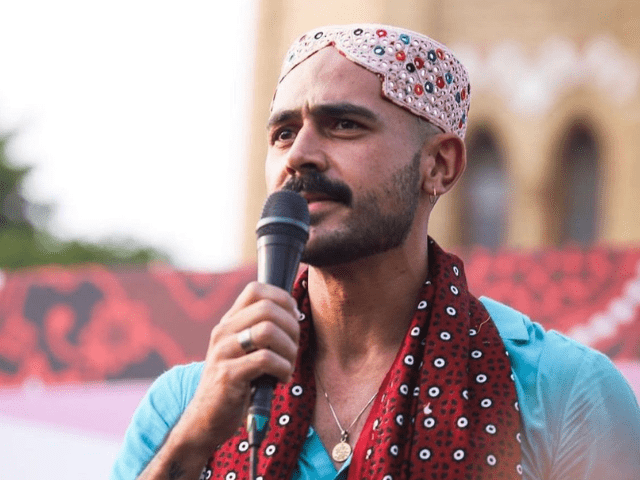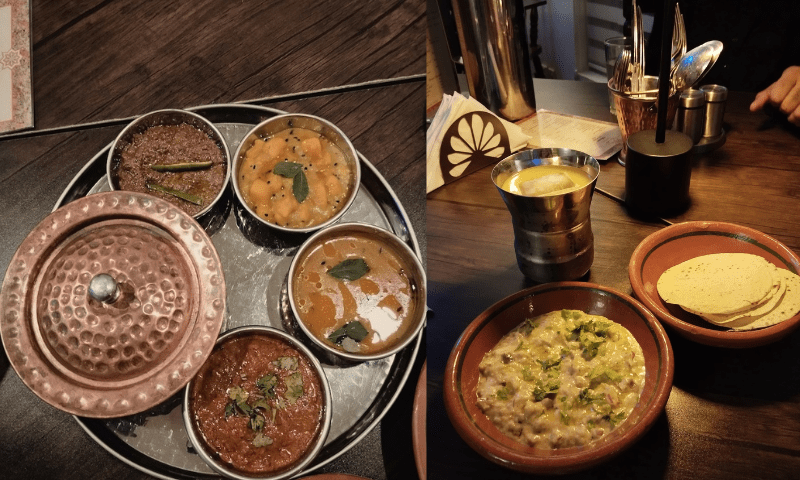Arooj Aftab’s Nöl Collective suit, created at a refugee camp, is a homage to Palestine
Grammy-winning artist Arooj Aftab collaborated with Yasmeen Mjalli, founder and creative director of Nöl Collective — a self-described intersectional fashion house creating garments in the Palestinian territories — for her performance at Barbican Hall in London on June 2.
Aftab told Vogue that she was given her first Nöl piece, a blazer, by her manager back in October 2021 and that they had both been fans of Mjalli from her earliest designing days. She was moved by the Palestinian children’s poem embroidered on the back of the jacket and loved the “shades of emotion” in the gifted blazer.
She ended up wearing it for her debut NPR Tiny Desk concert which was released in December of that same year. After this, they planned to collaborate for her 2023 international tour.
During the performance, the singer wore a two-piece rusty auburn coloured silk suit — which combines symbols of Aftab’s Pakistani heritage with Mjalli’s Palestinian roots. It was made purely out of raw silk taffeta, a homage to fabric used in Pakistani wedding garments and, historically, by South Asian royalty. On the shoulders, arms and legs of the piece, Mjalli used a block-print pattern and glittered corners of that print with the tatreez flower motif from Mjalli’s home city of Ramallah.
Aftab posted a picture of it on Instagram, saying, “This collaboration is so close to my broken little heart. Yasmeen Mjalli of @nolcollective created this fire outfit with troubling history and sorrow of a land so precious deeply woven into a raw silk fabric, in a color of resistance and hope. I wore it in London on stage at the Barbican Centre performing Love In Exile. I will hold our shades of pain in power until we see the world change.”
“When I started thinking about what I wanted to create for Arooj, I was drawn to how effortlessly she embraces strong, powerful looks,” the designer told Vogue. “She wears blazers and capes with big shoulders and is commanding in her aesthetic,” Mjalli said. “I wanted to emulate that in this piece for Barbican and her tour and give her a powerful presence on stage.”
Mjalli created Nöl, meaning loom in Arabic, in March 2021 and after exploring various ways to convey the message she wanted to give through her brand, she finally discovered groups of Palestinian women embroidering in their homes, using technique traditionally taught to a Palestinian daughter by her mother.
Mjalli gradually discovered an extensive network of Palestinian craftspeople through word of mouth from her newfound embroiderers and others she found on Facebook. But it was on her trip to the city of Nablus that she found the ideal suit and blazer tailors. She was introduced to Khalid, Amin, and Hamdi by a friendly tour guide. These three brothers from the Askar refugee camp eventually tailored Aftab’s outfit for her performance at Barbican Hall.
In the interview, Mjalli revealed the extremely interesting and intense process of creating Aftab’s suit. She said the biggest issue they faced was the shipment — without the freedom to mail and ship products between tailors, weavers, and artisans, Mjalli pays taxi drivers an extra fee to transport Nöl’s materials from territory to territory. When that’s unavailable, she takes on the role of driver herself and spends hours moving their products back and forth. She can only ship her products out of Palestine from Ramallah.
“Shipping is always a nightmare,” said the designer. “Our products are often randomly detained by Israeli authorities and held up in checkpoints for days or even weeks at a time. With unexpected border closures by the Israeli military and national strikes, I can never guarantee to my customers when their product will actually arrive.”
That’s what happened with Aftab’s piece as well. Mjalli’s mother undertook the responsibility to drive the selected fabric from Ramallah to the tailors in the Askar refugee camp, then back to Ramallah to ship to London weeks before Aftab’s performance.
At the time, Mjalli was in London, intending to personally block-print and embroider the garment. However, the day before her fitting with Aftab, the garment had still not arrived. Mjalli discovered that the Tel Aviv post office had prevented the shipment of Aftab’s tailored suit, without disclosing the reasons to her. With less than a week remaining until the performance, Mjalli worked with her mother to reroute the package through Jordan and then through Saudi Arabia to finally ensure its way to London.














